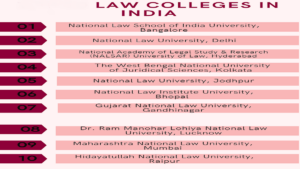NLU Admission Process 2026: Ever imagined yourself arguing big cases in a courtroom? National Law Universities (NLUs) make that dream possible! Most NLUs admit students through the CLAT exam, which assesses aptitude, reasoning, and legal knowledge, and is used by the majority of NLUs to accept students. However, NLU Delhi is distinct in that admission is determined by the AILET exam.
Knowing these details early helps students organize their preparation, remain ahead of the game, and feel more confident. Candidates can take the appropriate actions toward their ideal legal career by being aware of eligibility requirements, test trends, and crucial dates. Make your path to an NLU thrilling and prosperous by being well-prepared, maintaining focus, and working hard!
What is NLU and Why Students Should Choose It?
National Law Universities (NLUs) are India’s most prestigious institutions for legal studies. They were established to improve the quality of law education and to train students as future lawyers, judges, corporate advisors, and policy-makers. Currently, there are 24 NLUs across India, each known for its academic excellence and competitive environment.
Why Choose an NLU?
Choosing an NLU means choosing a platform that not only teaches law but also shapes you into a confident professional ready to excel in any field of law. With dedication and preparation, you can secure a seat in these prestigious institutes and start your legal journey.
- Top-Quality Education: NLUs follow modern teaching methods with case studies, research projects, moot courts (mock trials), and debates, making learning practical and exciting.
- National Reputation: A degree from an NLU carries a lot of weight. It opens doors to careers in law firms, the judiciary, civil services, multinational companies, and NGOs.
- Strong Placement Opportunities: Top law firms and corporate companies recruit directly from NLUs. Many graduates also secure international internships and scholarships.
- Holistic Development: Apart from academics, students gain exposure to legal competitions, seminars, workshops, and cultural activities, which build confidence and leadership skills.
- Networking and Alumni Support: NLU graduates form a strong alumni network, providing guidance, mentorship, and career opportunities.
NLU Admission Process 2026
Dreaming of a career in law? In India, National Law Universities (NLUs) are the best option for aspiring attorneys. In addition to LLM and PhD programs for advanced education, they provide undergraduate BA LLB (Hons) programs. While NLU Delhi administers its own exam, AILET, students must pass the Common Law Admission Test (CLAT) in order to be admitted.
Students must get at least 45% in Class 12 (or 40% in restricted categories) in order to be eligible for BA LLB. An LLB degree is necessary for LLM. Completing the application, taking the entrance exam, reviewing the results, receiving counseling, assigning a seat, and verifying admission are all steps in the admissions process. This procedure, however a little drawn out, guarantees that only the most committed students are accepted into esteemed NLUs.
Eligibility Criteria for NLU Admission 2026
National Law Universities (NLUs) offer admission mainly through the CLAT exam, except for NLU Delhi, which conducts AILET. Eligibility criteria are very important for both UG (BA LLB) and PG (LLM) courses. Here’s the detailed explanation:
1. For Undergraduate (BA LLB)
- Qualification: Candidates must have passed Class 12 (10+2) or equivalent from a recognized board.
- Minimum Marks:
General/OBC category: Students with the General or OBC category are to have at least 45% marks.
SC/ST category: At least 40% marks are required for students from the SC/ST category.
- Students Appearing: Those appearing for Class 12 exams in the same year are also eligible.
- Age Limit: Currently, there is no upper age limit for CLAT UG.
2. For Postgraduate (LLM)
- Qualification: Candidates must hold a 3-year or 5-year LLB degree from a recognized university.
- Minimum Marks:
General/OBC category: At least 50% marks are required for students from the General or OBC category to be eligible for the postgraduate law courses.
SC/ST category: Students with the SC/ST Category are required to have at least 45% marks.
- Students Appearing: Final-year LLB students can also apply.
- Age Limit: No upper age limit for CLAT PG.
Entrance Exams for Admission to Top NLUs
Do you dream of becoming a successful lawyer, judge, or working in a big corporate firm? Then your journey starts with the National Law Universities (NLUs) – India’s top law colleges. Getting admission here is not easy; students have to clear tough entrance exams that test their knowledge, speed, and reasoning skills. Among these, CLAT and AILET are the most important exams. Let’s understand them in detail:
1. CLAT (Common Law Admission Test)
CLAT (Common Law Admission Test) is the biggest law entrance exam in India. It gives admission to 24 NLUs (except NLU Delhi). The exam checks your skills in English, Legal Reasoning, Logical Reasoning, General Knowledge, and Quantitative Techniques. Many private colleges also accept CLAT scores. The CLAT 2026 application process began on August 1, 2025, and will remain open until October 31, 2025. The entrance exam is scheduled to be held on December 7, 2025.
2. AILET (All India Law Entrance Test)
All India Law Entrance Test (AILET) is conducted by NLU Delhi. Unlike other NLUs, AILET is conducted only for admission to NLU Delhi, which does not accept CLAT scores. The AILET 2026 application process started on August 7, 2025, and will close on November 10, 2025. The exam will take place on December 14, 2025. This exam is highly competitive because NLU Delhi has limited seats, making it tougher to crack.
Also Check: List of AILET Colleges
3. Other Law Entrance Exams
Some private universities and state law colleges conduct their own exams. But for admission into top NLUs (National Law Universities), only CLAT and AILET matter.
4. Which Exam Should You Choose?
- To enter most NLUs, students are required to appear for the CLAT (Common Law Admission Test).
- For NLU Delhi, students must note that the AILET (All India Law Entrance Test) is the only way.
- Smart aspirants prepare for both to increase their chances.
Step-by-Step Application Process for NLU Admission 2026
Step 1: Visit the official CLAT or AILET website.
Step 2: Fill out the NLU Application Form by simply entering personal and academic details accurately.
Step 3: Upload Documents such as your respective Passport-size photo, signature, and academic certificates.
Step 4: Pay the NLU Admission Application Fee, which is usually ₹4,000–₹5,000.
Step 5: Submit the form and download the confirmation receipt for future reference.
Step 6: Make sure to double-check all details before submission to avoid mistakes.
Admission Process After Exams
Once results are declared:
- The NLUs prepare a detailed list based on entrance exam scores.
- Qualified students are required to attend counseling to select their preferred NLU and course.
- Candidates are required to bring a few documents, such as Original certificates, mark sheets, and ID proof, for the verification process.
- After completing all formalities, students are required to complete the Fee Payment & Enrollment part.
Preparation Plan for NLU Admission 2026
Consistent practice and proper strategy make a huge difference in clearing CLAT or AILET. Getting admission in an NLU requires focus, preparation, and understanding the process step by step. By following this guide, students can confidently plan their preparation, apply correctly, and secure their dream seat in a National Law University.
- Start early and make a study plan
- Solve previous years’ question papers and sample papers
- Read newspapers, magazines, and legal updates for current affairs
- Take mock tests to improve speed and accuracy
- Work on time management to complete all sections during the exam











 SLAT 2026 Exam Date Out, Check Eligibil...
SLAT 2026 Exam Date Out, Check Eligibil...
 AILET Colleges 2026 List Out, Know Which...
AILET Colleges 2026 List Out, Know Which...
 AILET Exam Pattern 2026, Check Marking S...
AILET Exam Pattern 2026, Check Marking S...









